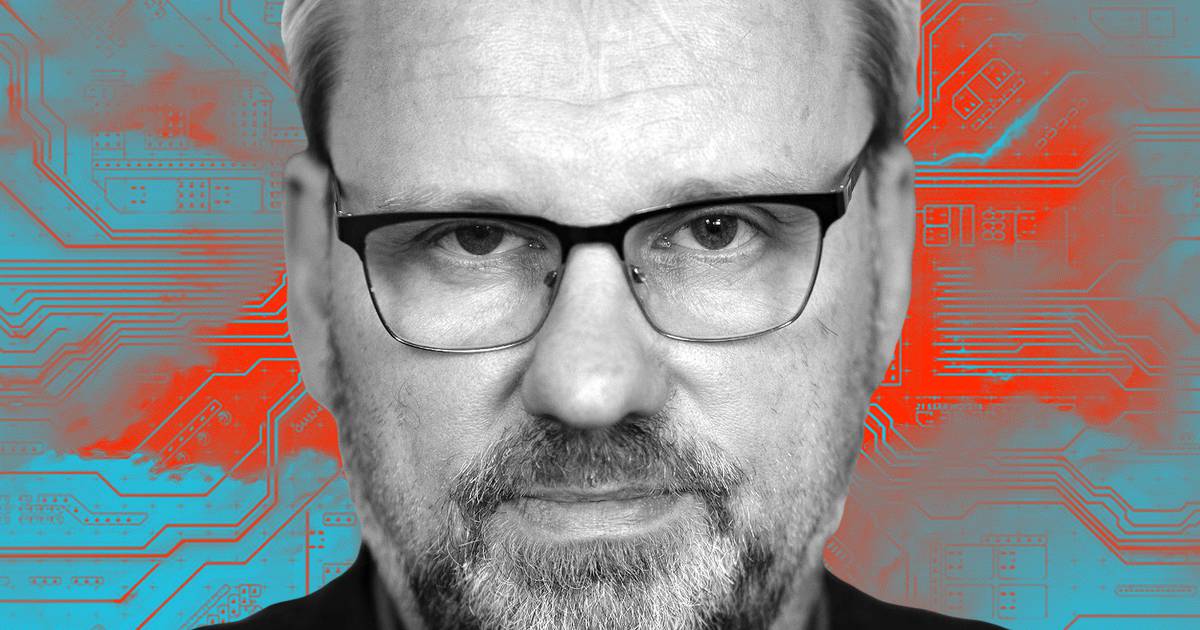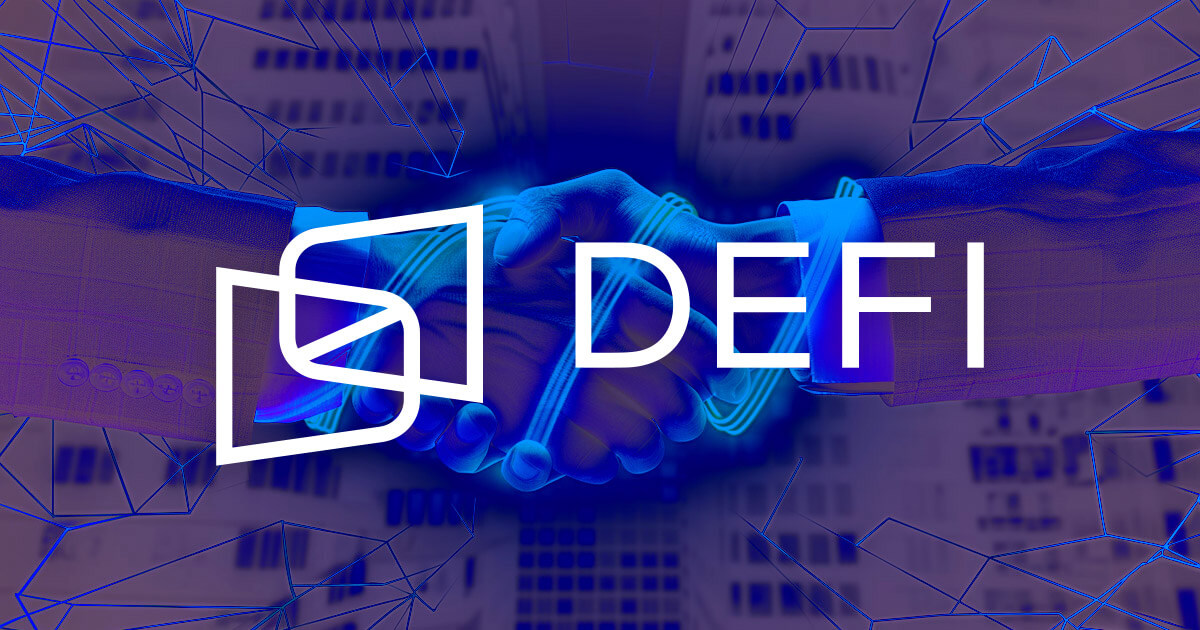DeFi
How crypto is the Amazon of money – DL News

- The social value promised by Defi lies in the elimination of financial intermediaries.
- Don’t fall for the hype when it comes to financial innovation.
Wolfgang Münchau is a columnist for DL News. He is co-founder and director of Eurointelligence and writes a column on European affairs for the New Statesman. The opinions are his own.
As a young financial journalist in the mid-1980s, I met the late Ivan Boesky, an investor who called himself a modern arbitrageur.
He cheated on me.
Old arbitrage involved exploiting price differences between exchanges. If sterling bills of exchange were cheaper in medieval Paris than in Bruges, an investment banker would buy them in Paris and resell them in Bruges.
This would lead to price equalization. Even though everyone is in it for the money, this transaction has social value. This increased the efficiency of markets.
But that’s not what Boesky did. He implausibly claimed that he would arbitrate information – merger arbitrage as he called it.
This seemed intriguing to us, but it turned out to be a euphemism for insider trading.
A few months after we met, he was arrested. What appeared to me to be a financial innovation turned out to be old-fashioned fraud.
Join the community to receive our latest stories and updates
He served time in prison, was banned for life from financial markets, became a government informant and stayed out of the spotlight until his death last month.
Michael Douglas’ Gordon Gekko character in the 1987 film “Wall Street” — the “greed is good” part — was based on Boesky.
What the Boesky experience taught me is that financial innovation doesn’t really exist.
“When someone claims to have created an innovation, it is usually more likely that they have found a way to hide the risks.”
This may seem like a bold statement. But think about it.
Finance is the intermediation between borrowers and lenders, between savers and investors.
You can structure credit in different ways. Or hedge the risk.
But when someone claims to have created an innovation, it’s usually more likely that they’ve found a way to hide the risks. Case in point: U.S. subprime mortgages in the 2000s, which hid bad loans in vast pools of investment-grade products.
Fundamental observation
So how does this apply to crypto, or more specifically decentralized finance?
Let’s start with the tendency of many to confuse the properties of DeFi instruments – tokens, blockchain networks, smart contracts – with the industry itself.
The social value promised by Defi lies in the elimination of financial intermediaries. This is a big deal that would justify some of the significant investment flows into the crypto industry.
What Amazon did initially for books, and then for everything else, is what crypto can do for finance.
The potential of crypto
In finance, you can estimate the current costs of the rent-seeking intermediary in terms of the margin between market interest rates and borrowing rates, or credit card interest rates.
In other words, the gap you see between central bank capital and the rate your bank gives you on deposits, or charges you on debt, is extremely wide.
This is the savings potential that crypto can offer.
This can take some of the hassle out of applying for a mortgage and can connect borrowers and lenders in a way that is not possible with the mostly static institutions of modern finance.
But be wary of claims that go beyond that. In statistics, there is a famous method called “bootstrapping” – a sampling technique that superficially appears to create data out of nothing.
You can bootstrap data, but you can’t bootstrap money, just as a central bank cannot increase the money supply beyond certain thresholds over long periods of time without creating inflation.
Bubbles can persist surprisingly long, even decades. Some people will go on a killing spree while it lasts. If it is not sustainable, it will end.
The natural barrier for DeFi is that ownership of real assets is governed by national laws. A court decision is required to claim the property of a delinquent debtor.
Unsecured loans, which are the business of banks, are difficult in a purely cryptographic world.
Wholesale financial markets already operate with high levels of efficiency and low margins.
From an economic perspective, the main promise of DeFi would lie in those parts of financial markets that suffer the most friction in the form of high transaction costs and barriers to entry.
This would be a social value, but it would still require crypto-friendly regulation.
Social value
This scenario is different from the one I’ve discussed in previous columns about crypto as a potential replacement for fiat currency. This does not require collusion of authorities.
The social value here is the freedom to carry out transactions without state control. What both have in common is the elimination of rent-seeking middlemen.
For DeFi, the middleman argument is the one that matters most. But I find it hard to imagine a world of decentralized finance that operates on a large scale outside of legal systems.
In a fiat currency system, a distinction is made between internal and external money. Domestic money is money created by banks – through loans for example.
Foreign money exists outside of the financial system, like gold. Cryptocurrency can be classified as external currency from the perspective of the non-crypto world.
In this definition, crypto is a bubble that bursts or is fueled by fiat currency that allows crypto investors to liquidate their positions.
But don’t be fooled by the hype of financial innovation. There are many Boeskys in the crypto space.
I think Amazon is the best way to think about Defi. Amazon has brutally cut out the middlemen.
But just as Amazon did not reinvent the book, cryptocurrencies will not reinvent finance.
DeFi
Pump.Fun is revolutionizing the Ethereum blockchain in terms of daily revenue

The memecoin launchpad saw the largest daily revenue in all of DeFi over the past 24 hours.
Memecoin launchpad Pump.Fun has recorded the highest gross revenue in all of decentralized finance (DeFi) in the last 24 hours, surpassing even Ethereum.
The platform has raised $867,429 in the past 24 hours, compared to $844,276 for Ethereum, according to DeFiLlama. Solana-based Telegram trading bot Trojan was the third-highest revenue generator of the day, as memecoin infrastructure continues to dominate in DeFi.
Pump.Fun generates $315 million in annualized revenue according to DeFiLlama, and has averaged $906,160 per day over the past week.
Income Ranking – Source: DeFiLlama
The memecoin frenzy of the past few months is behind Pump.fun’s dominance. Solana-based memecoins have been the main drug of choice for on-chain degenerates.
The app allows non-technical users to launch their own tokens in minutes. Users can spend as little as $2 to launch their token and are not required to provide liquidity up front. Pump.Fun allows new tokens to trade along a bonding curve until they reach a set market cap of around $75,000, after which the bonding curve will then be burned on Raydium to create a safe liquidity pool.
Pump.Fun generates revenue through accrued fees. The platform charges a 1% fee on transactions that take place on the platform. Once a token is bonded and burned on Raydium, Pump.fun is no longer able to charge the 1% fee.
Ethereum is the blockchain of the second-largest cryptocurrency, Ether, with a market cap of $395 billion. It powers hundreds of applications and thousands of digital assets, and backs over $60 billion in value in smart contracts.
Ethereum generates revenue when users pay fees, called gas and denominated in ETH, to execute transactions and smart contracts.
DeFi
DeFi technologies will improve trading desk with zero-knowledge proofs

DeFi Technologies, a Canadian company financial technology companyis set to enhance its trading infrastructure through a new partnership with Zero Computing, according to a July 30 statement shared with CryptoSlate.
The collaboration aims to integrate zero-knowledge proof tools to boost operations on the Solana And Ethereum blockchains by optimizing its ability to identify and execute arbitrage opportunities.
Additionally, it will improve the performance of its DeFi Alpha trading desk by enhancing its use of ZK-enabled maximum extractable value (MEV Strategies).
Zero knowledge Proof of concept (ZKP) technology provides an additional layer of encryption to ensure transaction confidentiality and has recently been widely adopted in cryptographic applications.
Optimization of trading strategies
DeFi Technologies plans to use these tools to refine DeFi Alpha’s ability to spot low-risk arbitrage opportunities. The trading desk has already generated nearly $100 million in revenue this year, and this new partnership is expected to further enhance its algorithmic strategies and market analysis capabilities.
Zero Computing technology will integrate ZKP’s advanced features into DeFi Alpha’s infrastructure. This upgrade will streamline trading processes, improve transaction privacy, and increase operational efficiency.
According to DeFi Technologies, these improvements will increase the security and sophistication of DeFi Alpha’s trading strategies.
The collaboration will also advance commercial approaches for ZK-enabled MEVs, a new concept in Motor vehicles which focuses on maximizing value through transaction fees and arbitrage opportunities within block production.
Additionally, DeFi Technologies plans to leverage Zero Computing technology to develop new financial products, such as zero-knowledge index exchange-traded products (ETPs).
Olivier Roussy Newton, CEO of DeFi Technologies, said:
“By integrating their cutting-edge zero-knowledge technology, we not only improve the efficiency and privacy of our transactions, but we also pave the way for innovative trading strategies.”
Extending Verifiable Computing to Solana
According to the release, Zero Computing has created a versatile, chain-agnostic platform for generating zero-knowledge proofs. The platform currently supports Ethereum and Solana, and the company plans to expand compatibility with other blockchains in the future.
The company added that it is at the forefront of introducing verifiable computation to the Solana blockchain, enabling complex computations to be executed off-chain with on-chain verification. This development represents a significant step in the expansion of ZKPs across various blockchain ecosystems.
Mentioned in this article
Latest Alpha Market Report
DeFi
Elastos’ BeL2 Secures Starknet Grant to Advance Native Bitcoin Lending and DeFi Solutions

Singapore, Asia, July 29, 2024, Chainwire
- Elastos BeL2 to Partner with StarkWare to Integrate Starknet’s ZKPs and Cairo Programming Language with BeL2 for Native DeFi Applications
- Starknet integration allows BeL2 to provide smart contracts and dapps without moving Bitcoin assets off the mainnet
- Starknet Exchange Validates the Strength of BeL2’s Innovation and Leadership in the Native Bitcoin Ecosystem
Elastos BeL2 (Bitcoin Elastos Layer2) has secured a $25,000 grant from Starknet, a technology leader in the field of zero-knowledge proofs (ZKPs). This significant approval highlights the Elastos BeL2 infrastructure and its critical role in advancing Bitcoin-native DeFi, particularly Bitcoin-native lending. By integrating Starknet’s ZKPs and the Cairo programming language, Elastos’ BeL2 will enhance its ability to deliver smart contracts and decentralized applications (dapps) without moving Bitcoin (BTC) assets off the mainnet. This strategic partnership with Starknet demonstrates the growing acceptance and maturity of the BeL2 infrastructure, reinforcing Elastos’ commitment to market leadership in the evolving Bitcoin DeFi market.
Starknet, developed by StarkWare, is known for its advancements in ZKP technology, which improves the privacy and security of blockchain transactions. ZKPs allow one party to prove to another that a statement is true without revealing any information beyond the validity of the statement itself. This technology is fundamental to the evolution of blockchain networks, which will improve BeL2’s ability to integrate complex smart contracts while preserving the integrity and security of Bitcoin.
“We are thrilled to receive this grant from Starknet and announce our partnership to build tighter integrations with its ZKP technology and the Cairo programming language,” said Sasha Mitchell, Head of Bitcoin Layer 2 at Elastos. “This is a major milestone for BeL2 and a true recognition of the maturity and capabilities of our core technology. This support will allow us to further develop our innovation in native Bitcoin lending as we look to capitalize on the growing acceptance of Bitcoin as a viable alternative financial system.”
A closer integration with Cairo will allow BeL2 to leverage this powerful programming language to enhance Bitcoin’s capabilities and deliver secure, efficient, and scalable decentralized finance (DeFi) applications. Specifically, the relationship with Cairo reinforces BeL2’s core technical innovations, including:
- ZKPs ensure secure and private verification of transactions
- Decentralized Arbitrage Using Collateralized Nodes to Supervise and Enforce Fairness in Native Bitcoin DeFi
- BTC Oracle (NYSE:) facilitates cross-chain interactions where information, not assets, is exchanged while Bitcoin remains on the main infrastructure
BeL2’s vision goes beyond technical innovation and aims to innovate by creating a new financial system. The goal is to build a Bitcoin-backed Bretton Woods system, address global debt crises, and strengthen Bitcoin’s role as a global hard currency. This new system will be anchored in the integrity and security of Bitcoin, providing a stable foundation for decentralized financial applications.
As integration with Starknet and the Cairo programming language continues, BeL2 will deliver further advancements in smart contract capabilities, decentralized arbitration, and innovative financial products. At Token 2049, BeL2 will showcase further innovations in its core technologies, including arbitrators, that will underscore Elastos’ vision for a fairer decentralized financial system rooted in Bitcoin.
About Elastos
Elastos is a public blockchain project that integrates blockchain technology with a suite of redesigned platform components to produce a modern Internet infrastructure that provides intrinsic privacy and ownership protection for digital assets. The mission is to create open source services that are accessible to the world, so developers can create an Internet where individuals own and control their data.
The Elastos SmartWeb platform enables organizations to recalibrate how the Internet operates to better control their own data.
https://www.linkedin.com/company/elastosinfo/
ContactPublic Relations ManagerRoger DarashahElastosroger.darashah@elastoselavation.org
DeFi
Compound Agrees to Distribute 30% of Reserves to COMP Shareholders to End Alleged Attack on Its Governance

Compound will introduce the staking program in exchange for Humpy, a notorious whale accused of launching a governance attack on the protocol, negating a recently adopted governance proposal.
Compound is launching a new staking program for COMP holders as a compromise with Humpy, a notorious DeFi whale accused of launching a governance attack against the veteran DeFi protocol.
On July 29, Bryan Colligan, head of business development at Compound, published a governance proposal outlining plans for a new compound participation product that would pay 30% of the project’s current and future reserves to COMP participants.
Colligan noted that the program was requested by Humpy in exchange for his agreement Proposition 289 — which sought to invest 499,000 COMP worth approximately $24 million into a DeFi vault controlled by Humpy, and which appears to have been forced by Humpy and his associates over the weekend.
“We propose the following staking product that meets Humpy’s stated interests as a recent new delegate and holder of COMP in exchange for the repeal of Proposition 289 due to the governance risks it poses to the protocol,” Colligan said. “The Compound Growth Program…will execute the above commitments, given the immediate repeal of Proposition 289.”
Colligan added that the proposal would expire at 11:59 p.m. EST on July 29. Had Humpy not rescinded Proposition 289, Compound would move forward with it. Proposition 290 — block Humpy using the Compound team’s multi-sig to deploy a new governor contract removing the delegate’s governance power behind Proposition 289.
Hunchback tweeted that Proposition 289 had been repealed a few hours ago. “Glad to have brought Compound Finance back into the spotlight,” they said. added. “StakedComp… finally becomes a yield-generating asset!
Markets reacted favorably to the resolution, with the price of COMP increasing by 6.2% over the past 24 hours, according to CoinGecko.
Attack on governance
Proposition 289 proposed investing 499,000 COMP from the Compound treasury into goldCOMP, a yield-generating vault of the Humpy-linked Golden Boys team.
The proposal passed with nearly 52 percent of the vote on July 28, despite two previous iterations of the proposal being defeated by strong opposition. Can And JulyThe proposals notably asked for only 92,000 COMP, with security researchers warning that any deposit of tokens into the goldCOMP vault would cede their governance power.
In May, Michael Lewellen of Web3 security firm OpenZeppelin, note The first proposal was submitted by a new governance delegate who was suddenly awarded 228,000 COMP by five wallets that got their tokens from the Bybit exchange. Combined with his own tokens, the delegate got 325,333 COMP, which is over 81% of the 400,000 tokens required for a governance proposal to reach quorum.
“We have been alerting the community to the risk that these delegates could support a potential attack on governance,” Lewellen said. “The timing of the new proposal and these recent delegations are suspect.”
Read more: Compound community accuses famous whale of attacking engineering governance
-

 News11 months ago
News11 months agoVolta Finance Limited – Director/PDMR Shareholding
-

 News11 months ago
News11 months agoModiv Industrial to release Q2 2024 financial results on August 6
-

 News11 months ago
News11 months agoApple to report third-quarter earnings as Wall Street eyes China sales
-

 News11 months ago
News11 months agoNumber of Americans filing for unemployment benefits hits highest level in a year
-

 News1 year ago
News1 year agoInventiva reports 2024 First Quarter Financial Information¹ and provides a corporate update
-

 News1 year ago
News1 year agoLeeds hospitals trust says finances are “critical” amid £110m deficit
-

 DeFi1 year ago
DeFi1 year ago🏴☠️ Pump.Fun operated by Insider Exploit
-

 Tech1 year ago
Tech1 year agoBitcoin’s Correlation With Tech Stocks Is At Its Highest Since August 2023: Bloomberg ⋆ ZyCrypto
-

 Tech1 year ago
Tech1 year agoEverything you need to know
-

 News11 months ago
News11 months agoStocks wobble as Fed delivers and Meta bounces
-

 Markets1 year ago
Markets1 year ago20 Top Crypto Trading Platforms to Know
-

 News11 months ago
News11 months agoHutchinson House and Senate Candidates Report Finances Ahead of Election












